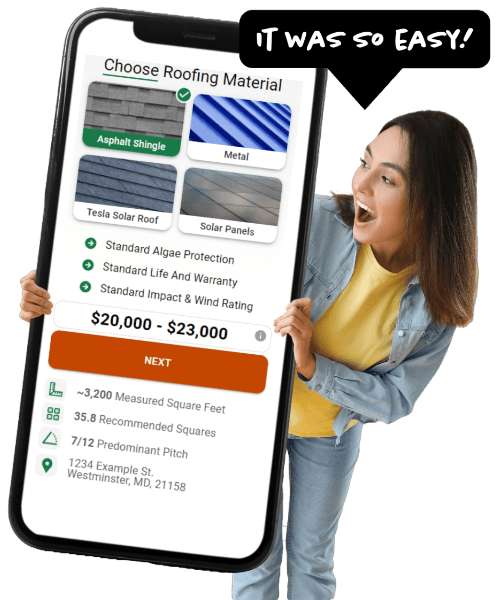Find a Roofer
With a total of 44,227 active roofers, Instant Roofer will help you find a roofer in no time with our constantly updating database. With validated reviews, contact information, and pricing you can find the best match for your project.
No signup is required.


Estimate
Our roof replacement cost calculator has determined the average price of a roof in the USA is $7,662
Instant Roofer Connects You to Top-Rated Local Roofers
Instant Roofer makes it easy to find a roofer and connect with contractors in your local area with our AI-powered roofing calculator. Our database is constantly expanding and updating, so connecting to the highest rated roofer in your area is fast and easy! Researching and connecting with all of the roofers in your area can be time consuming, so we have compiled and connected with hundreds of roofers across the nation so you don’t have to. Just enter your address and be connected with the top-rated roofers in your area.
10 Steps To Find A Roofer
How to choose a roofer? Depending on the roofer you go with, it can be a seamless experience or a nightmare. Instant Roofer connects you with expert roofers in your area with the highest ratings. Why? So you don’t have to do all the work below! But, if you’re an overachiever, here’s a step-by-step guide on how to choose a roofer:
1. Research and Referrals
Starting your quest to find a roofer with thorough research is a solid foundation for a successful project. Here’s how to start:
- Recommendations: Reach out to your circle of friends, family, and neighbors who have recently had roofing work done. They can provide invaluable insights into their experiences with specific contractors, including their satisfaction with the quality of work, communication, and adherence to timelines.
- Online Reviews: In the digital age, online reviews and ratings are powerful tools. Platforms like Google, Yelp, and specialized contractor review websites offer a wealth of information. These reviews often come from homeowners who have no personal connection to the contractor, offering unbiased opinions.
- Compile a List: As you gather recommendations and review information, create a list of potential roofing contractors. This list will serve as your initial pool of candidates to consider for your project.

2. Check Credentials
Once you find a roofer that you’re interested in, verify that the contractors on your list are licensed, insured, and bonded so they can legally do the work. This part can be a little cumbersome, but it’s so worth it. If a roofer makes a big mistake and they don’t have insurance, then you are left with paying the bill and chasing them through court.
- Licensing: Verify that the roofing contractors on your list are properly licensed to work in your area. Licensing requirements vary by location, but it’s an assurance that they meet the legal requirements set by your state or municipality.
- Insurance: Ensure that the roofing contractor has comprehensive insurance coverage. This includes both liability insurance, which protects you and your property in the event of accidents or damages, and worker’s compensation, which covers their employees. Adequate insurance provides financial protection in case of unforeseen incidents during the project.
- Bonding: A bonded contractor has taken an extra step to provide financial protection. Bonding is a form of insurance that can compensate you if the contractor fails to complete the project as specified in the contract.

3. Experience Matters
Look for roofers with a proven track record and years of experience in the industry. Experienced roofers are more likely to handle a variety of roofing issues competently. This also covers you so that you aren’t the first customer when a new roofing company is just figuring things out. A huge investment like your roof should be taken care of by people who know what they are doing!
Deduce a roofer’s competency and ability to handle a wide range of roofing leads and challenges from the following:
- Proven Track Record: Roofers with a proven track record have successfully completed numerous projects over the years. This is a strong indicator of their ability to tackle common roofing issues efficiently and effectively.
- Specialized Expertise: Some experienced roofers specialize in specific aspects of roofing, such as different materials or architectural styles. If you have unique requirements for your project, such as a specific roofing material or design, seeking a roofer with relevant experience is essential.

4. Local Knowledge
Choose a local roofer with a physical presence in your area. Local contractors are often more familiar with regional building codes, weather patterns, and suppliers. And choosing a local contractor supports your local economy and Instant Roofer always prioritizes supporting local businesses!
Opting for a local roofer offers numerous advantages:
- Familiarity with Building Codes: Local contractors are well-acquainted with regional building codes and regulations. This knowledge ensures that your project complies with local standards, reducing the risk of costly delays or non-compliance issues.
- Weather Insights: Local roofers understand the specific weather patterns in your area, which can influence the choice of roofing materials and installation techniques. They can recommend solutions that are better suited to your local climate.
- Supplier Relationships: Local roofers often have established relationships with local suppliers, which can result in faster and more cost-effective access to roofing materials.

5. Interview Roofers
Once you find a roofer in your local area, contact the roofing companies on your list and set up interviews or consultations covering the following.
- Ask about their years of experience in the roofing industry and if they’ve worked on projects similar to yours.
- Request to see their portfolio of past projects. This visual representation of their work will help you assess their craftsmanship, attention to detail, and the quality of their finished roofs.
- Discuss the various roofing materials available and seek their recommendations based on your needs, budget, and climate considerations. A knowledgeable roofer can guide you in selecting the most suitable material for your project.

6. Get Multiple Quotes
Start with our roof replacement cost calculator so you know your ballpark range. Then obtain detailed, written estimates from several roofing contractors and compare these quotes carefully. While it’s tempting to gravitate toward the lowest price, remember that the cheapest option may not always be the best one. Take into account the quality of the materials proposed and the expertise of the contractor. The goal is to strike a balance between affordability and quality. Pay attention to:
- Cost Variations: By obtaining multiple quotes, you get a clear picture of the cost range for your project. This not only helps you avoid potential overcharges.
- Detailed Breakdowns: A detailed, written estimate provides a breakdown of the costs associated with labor, materials, and any additional expenses.
- Project Timeline: In addition to the cost, carefully review the proposed timeline for each project. Consider how long each contractor estimates the project will take and whether their timeline aligns with your expectations.

7. Ask About Roofing Warranties
A warranty is your assurance that the roofing contractor stands by their work. Most reputable roofers will offer some kind of warranty on both the materials and labor relating to your roof replacement costs.
- Materials Warranty: Learn about the warranties provided for the roofing materials. Reputable roofers often work with trusted suppliers and can offer warranties that guarantee the quality and durability of these materials.
- Labor Warranty: A labor warranty is equally essential. It assures you that the roofer is confident in their workmanship and will address any installation issues that may arise after the project’s completion.

8. Check References
References are like a window into a roofer’s past performance. By asking for and following up on references, you can gain insights into the contractor’s reliability and professionalism. Their references may even allow you to come by and view their handiwork. Always follow up on references! Pay close attention to:
- Client Experiences: Request to contact previous clients and inquire about their experiences working with the roofer. A reliable roofer shouldn’t have a problem with you speaking to past clients! They may need to request permission as a formality though. When speaking with them, ask about the quality of work, adherence to timelines, and how the contractor handled any challenges or issues that arose during the project.
- Work Quality: Discuss the longevity with previous clients and performance of the completed roofs. Are there any ongoing issues, or has the roofing system held up well over time? It would be valuable to speak to a client who had to use their warranty as well to understand how understanding the roofing contractor can be.

9. Communication
Once you find a roofer, pay close attention to the roofer’s communication style and responsiveness. Clear communication is essential for a successful project.
- Responsiveness: How long do they take to get back to you? How quickly do they get you quotes or estimations? Do they use multiple channels of communication? Making sure the roofer you find is a pro at communicating will make this long project feel more manageable.

10. Contract & Payment Terms
A well-structured contract and payment terms are key to a transparent and successful roofing project:
- Contract Review: Thoroughly review the contract provided by the roofer. Ensure that it contains all the essential project details, including costs, materials, and timelines. Seek clarification on any terms or clauses that you don’t fully understand.
- Payment Schedule: Be cautious of contractors who insist on full payment upfront. A typical payment schedule includes an initial down payment and periodic payments as work progresses. The final payment is typically due upon the project’s successful completion. Check out our roofing finance calculator to see how you can stretch your payment plan responsibly.

Trust Your Gut
Ultimately, trust your instincts. Choose a roofer who makes you feel confident and comfortable. The relationship between you and the roofing contractor is an important aspect of a successful project. Instant Roofer has tried to compile, vet, and gather all this information for you just so you don’t have to! If you know what kind of material you’ll be wanting for your project, check out our roofing material calculators below!
- Asphalt Shingle Roofing Cost Calculator
- Metal Roof Cost Calculator
- Cedar Shake Roof Cost Calculator
- Flat Roof Cost Calculator
- Tesla Solar Roof Calculator
- Solar Panel Cost Calculator
Scan. Measure. Connect.
Roofing Contractor FAQ
When you find a roofer, he may start talking about “squares.” The cost a roofer charges per square can vary depending on your geographic location, the type of roofing material, the complexity of the job, and the specific roofing company. On average, you can expect to pay anywhere from $100 to $400 per square.
Here’s a quick breakdown of those factors and why they matter:
Location: Roofing costs differ by region due to variations in labor and material prices. Urban areas tend to be more expensive than rural ones.
Roofing Material: The type of roofing material you choose impacts the cost. Asphalt shingles are typically more affordable, while premium materials like metal, tile, or slate can cost significantly more.
Complexity: A more complex roof with features like multiple angles, dormers, or skylights may require additional labor and material, potentially driving up the cost per square.
Roofing Company: Different roofing companies may have varying pricing structures and levels of expertise. It’s important to obtain multiple quotes and consider the reputation and experience of the roofing contractor.
To get an accurate estimate for your specific project, it’s advisable to request quotes from local roofing contractors. They can assess the unique factors of your roof and provide a more precise cost per square based on your needs and preferences.
A roofing contractor is a professional or a company that specializes in roof-related work. Their primary focus is on the installation, repair, maintenance, and replacement of roofs for residential, commercial, and industrial buildings. Roofing contractors are typically experts in various types of roofing materials, construction methods, and safety protocols. They play a pivotal role in ensuring that a building’s roof is structurally sound, weather-resistant, and aesthetically pleasing.
Roofing contractors are responsible for:
1. Assessing the condition of existing roofs and recommending repairs or replacements.
2. Providing cost estimates for roofing projects.
3. Procuring the necessary materials and equipment for the job.
4. Installing new roofing systems or repairing existing ones.
5. Ensuring that the roofing work complies with local building codes and regulations.
6. Conducting inspections and quality checks to verify the integrity of the roof.
7. Offering warranties to guarantee the durability of their work.
When hiring a roofing contractor, it’s crucial to choose a reputable and experienced professional who can deliver high-quality roofing solutions while adhering to safety and industry standards
A roof replacement can cost a ton of money, so there’s no amount of prep work that can be considered “too much.” Asking the right questions can narrow down the list of local contractors to help you find a roofer that you want to work with, but you may not know where to start. Here is a quick list of questions to think about asking a roofer before hiring them:
1. Are you licensed and insured?
2. Can you provide references and/or a portfolio from past clients?
3. What is the estimated cost of the project?
4. What is the expected timeline for the project?
5. Will you handle the necessary permits for the project?
6. What warranties do you offer for materials and labor?
7. How do you handle cleanup and disposal of old materials?
8. Will you provide a detailed contract outlining the scope of work?
9. How do you handle unforeseen issues or changes during the project?
10. What payment schedule do you require?
The best and easiest way to find a quality and trusted roofing contractor is by getting a referral from someone you know and trust. But, since roofing projects only roll around every 10 or so years (roughly), you may not have anyone on hand that’s been through the situation close to you. Reviewing online reviews is another way to find a decent roofer. Instant Roofer has collected all this information for you and is ready to help you find a roofer for your unique project.
Depending on your location, weather, severity, needs, materials, and other factors, roof replacement could take anywhere from a few days to several weeks. Your roofer will be able to nail down exactly how long it’ll take and you can also ask what their policies are for handling unexpected issues like underlayment problems to bad weather.
Roofers typically charge based on various factors, including the type of roofing project, the roofing material used, the location, and the complexity of the job. Here are some general guidelines for understanding roofing costs:
Roof Repair: Simple repairs, like fixing a minor leak or replacing a few damaged shingles, may cost a few hundred dollars. More extensive repairs can range from a few hundred to a couple of thousand dollars.
Roof Replacement: On average, a residential roof replacement can cost anywhere from $5,000 to $15,000 or more. Larger or more complex roofs may cost even more.
New Roof Installation (New Construction): It depends on the size and design of the structure and the type of roofing material used. New construction roofing costs can range from a few thousand dollars to tens of thousands of dollars or more.
Cost per Square: Roofers often charge per square, with one square equal to 100 square feet of roofing. The cost per square can vary based on location and the specific roofing project but is typically in the range of $100 to $400 per square.
Additional Costs: Keep in mind that additional factors, such as removing the existing roof, roof pitch, number of stories, materials, permits, and inspections, can all influence the overall cost of a roofing project. Check out our roof pitch calculator to understand how it can affect your total.
You may need a new roof if you observe signs of wear such as cracked, curled, or missing shingles, especially if your roof is nearing its 20-25 year lifespan. Leaks or water stains on ceilings indicate potential roof failure. A sagging roof deck signals structural issues, while excessive granule loss in shingles diminishes their protective capabilities. Mold or moss growth may indicate moisture retention problems. Bald spots on shingles, daylight visible through the attic, or frequent, costly repairs are red flags. Higher energy bills can suggest poor roof insulation.
Industry standard says that you should get your roof inspected at least once per year. Regular inspections help identify small issues before they become big problems. Keeping a careful eye after severe weather events is a good idea as well as many insurance companies only cover weather damage for a limited amount of time. And the older your roof is, the more frequent checks may be warranted! Take a proactive approach to caring for your roof as it’s quite costly if damage seeps into your home.
During a roofing inspection, a qualified professional examines your roofing components to assess the overall condition of your roof. Here’s what typically happens:
External Evaluation: The inspector examines external elements like shingles, flashing, gutters, and drainage systems for wear or damage.
Material Assessment: Individual shingles are inspected for signs of damage, including cracking, curling, blistering, or granule loss. Missing shingles are noted as potential sources of leaks.
Flashing Inspection: The inspector checks flashing around chimneys, vents, and skylights for proper sealing, as damaged flashing can lead to water infiltration.
Gutter Examination: Gutters are inspected for debris, attachment, and signs of sagging, as misaligned gutters can contribute to water damage.
Attic and Interior Inspection: The inspector assesses attic ventilation, insulation, and checks for water damage. Interior spaces are examined for water stains or leaks indicating roof issues.
Structural Assessment: The overall structural integrity, including decking, is evaluated for signs of sagging or compromise.
Documentation and Recommendations: The inspector provides a detailed report with recommendations and may suggest repairs or replacement if the roof is aging.
Storm Damage Assessment: After severe weather, the inspector pays attention to storm-related damage such as hail impact or wind damage.
Are you a highly rated roofing contractor?
We want to work with you.

